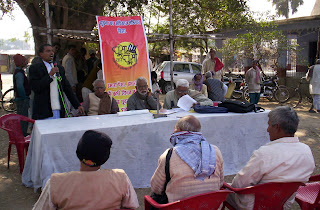Bihar is one of the first states to accept right to information applications on phone. The objective was to ensure transparency and to expand its reach to villages, where the literacy rate is low. But the real picture is different
BIHAR GOVERNMENT established the ’Jankari’ call centre on 29 January 2007 under the guidance of Ramon Magsaysay Award winning social activist, Arvind Kejriwal. Though it was not working in all the districts, but it was working well in the state capital. Vibhav of Parivartan, a social organisation, was monitoring the functioning of the call centre.
Soon after he left, the call centre adopted a laidback attitude. It is a user friendly ICT (Information and Communications Technology) based facilitation centre to help citizens of Bihar in getting governance related information from public information officers (PIOs) under the Right to Information Act, 2005 (RTI) within stipulated time frame. But people are facing hurdles in framing applications with this service.
Activists complain that the phone lines are often jammed, giving mental tension to the caller. According to some activists, the person framing the questions of the applicant is himself not much aware about the RTI Act. Therefore, the applications are often weak and thereby fail to trap the corrupt bureaucrats. It is also seen in some cases that the questions are not framed according to the desire of the applicant. This results in wrong interpretation of the information furnished by the applicant.
Use of ICT tools have been widely appreciated by the media and the people because of its user friendly format. It would be very useful for the rural people, who can get information without having to visit the office. But people are not able to use this facility, as it is not working in the villages as well as in the cities.
The sources say that Bihar has received nearly 1,700 telephonic applications on its number 155311 from the time it was established. Each call costs Rs 10 as fee and a copy of the application is sent to the applicant through courier.
"Nobody is picking up the phone, I wonder if the call centre still exists," says Sarfaraz, a Patna based social activist working on RTI. He further added that he tried to contact the call centre a number of times in the first week of October, but nobody picked up the phone even once. Recently, activists of different districts tried the number of the call centre, but the call was dropped each time. This shows technical errors, which are yet to be fixed.
However, any organisation can replicate the project of ‘Jankari’. Any private group can adopt this concept and it does not require any intervening government department. But the private organisation will have to enter into an agreement with the Government so that the necessary fees for filing of application under RTI Act could be deposited with the government treasury.










